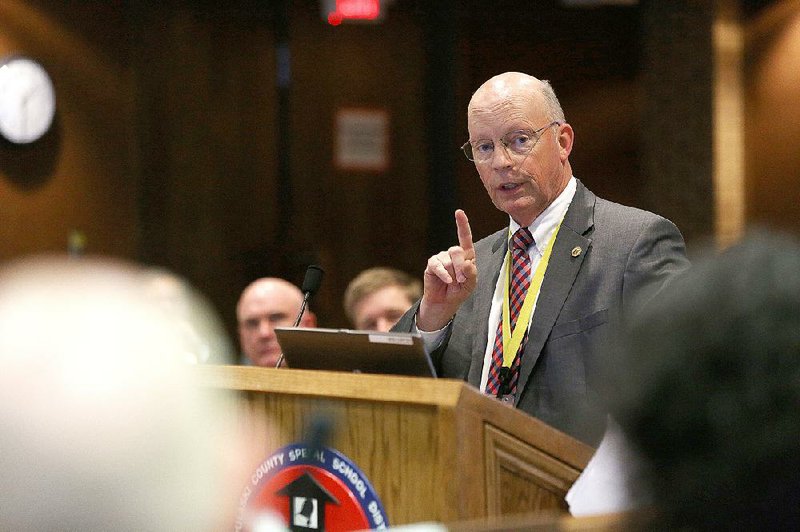Kurrus: LR district reworked, leaner
Baker Kurrus, superintendent of the state-controlled Little Rock School District, said Thursday that the state's largest district is operating with a tighter budget and with clearer lines of authority among employees newly empowered to do their jobs.
Speaking to the Arkansas Board of Education on Thursday, Kurrus also said employees at some of the district's academically challenged schools are being told that their schools will not be reconstituted and staffs will not be split up and sent to other schools. Instead, they are being encouraged to end their divisions and collaborate to solve the problems -- be it student discipline or employee absenteeism -- at their schools.
Baseline Elementary School is the only school to be reconstituted, meaning all positions are being vacated and opened for new applications.
Budget cuts of about $12 million are underway in the district's $330 million budget, Kurrus said.
"I actually do believe the district is better off with those cuts being made than it was before," he told the Education Board.
Some of the cuts are the result of restructuring the school day at three high schools and all middle schools to seven class periods, something that requires fewer teacher positions.
State adopts new science-ed gauges
The state Board of Education on Thursday adopted new science education standards for kindergarten through eighth grades.
The new standards, the work of 45 representatives from Arkansas schools, career education organizations, and colleges and universities, are based on the national 2013 Next Generation Science Standards but also refer to other education standards and include Arkansas-specific adjustments.
The new standards, like the standards that they will replace, center on life sciences, earth and space sciences, physical science and add, for the first time, engineering and technology education standards.
The purpose of the science standards is to prepare students to know and apply science concepts to real-world situations when they graduate from high school.
The new science standards for kindergarten through fourth grade will become the basis for classroom instruction starting in 2016 and for grades five through eight in 2017. A state committee will begin writing science standards for high school courses this summer, and those are scheduled to be submitted to the state Education Board next spring.
The standards can be viewed at the website: http://tinyurl.com/ndgpuyz.
Guy-Perkins listed in fiscal distress
Guy-Perkins School District is the latest Arkansas school district to be classified by the state Board of Education as fiscally distressed and must attain state approval before entering into contracts or incurring other financial obligations.
The state Department of Education staff flagged the school district for spending its reserve funds in recent years at a rate that jeopardizes the district's solvency. The district's unrestricted legal balance of $902,000 in 2012 dropped to $521,582 in 2014 and is projected to be $497,496 at the end of this school year, according to documents prepared by the Education Department.
Superintendent Brian Cossey appealed the identification, arguing that the district has reduced staffing and that it is unlikely that the district will drop below $521,000 this year. He said the amount should constitute a satisfactory reserve for a district of 403 students. He also noted that the district will seek a millage increase in September and is hopeful of benefiting from a pending lawsuit in a tax dispute.
Suggested district lines find support
The state Board of Education on Thursday accepted the recommendations made by its committee on Pulaski County school district boundaries.
The board included with the recommendations a supplemental statement on the issue written by Education Board Chairman Sam Ledbetter of Little Rock.
The Pulaski County boundary lines committee voted last month to recommend that the Education Board create one district south of the Arkansas River and four districts north of the river.
But the committee also acknowledged that the changes -- which could in effect eliminate the doughnut-shaped Pulaski County Special School District -- cannot occur while the Pulaski County Special School District remains under federal court supervision for its desegregation efforts.
"The constrains on the board are tremendous -- total -- until Pulaski County Special School District is declared unitary," board member and committee chairman Jay Barth said Thursday.
The committee proposed combining the Little Rock School District with most of the Pulaski County Special district that is south of the Arkansas River. Portions of the Pulaski County district that are in Saline County, including a portion of Shannon Hills, however, would be attached to the Bryant School District.
Additionally, the proposal envisions four districts north of the Arkansas River. That would include the formation of Maumelle and Sherwood districts carved from the Pulaski County Special District in accordance with state law, in addition to the existing North Little Rock and Jacksonville/North Pulaski school districts.
Negotiations among North Little Rock, Maumelle and Sherwood would be necessary to ascertain the most appropriate division of the Pulaski County Special district that is north of the river, the 2 1/2-page proposal states.
The committee's proposal also suggests that an eastern portion of the Pulaski County Special district be assigned to the England School District in Lonoke County "to maintain that community of interest while also reducing travel time for students."
Ledbetter said in his supplemental statement that while he concurred with the committee's work, he observed that dividing the county into five districts "is not compatible" with the concept of efficiency, and raises concerns about equality of funding and the potential for concentrating students into pockets of poverty.
He also said there may be value in giving the existing Pulaski school districts -- long involved in a desegregation lawsuit -- "some breathing room" or the opportunity to succeed "outside of the interference that litigation has represented."
A Section on 06/12/2015
